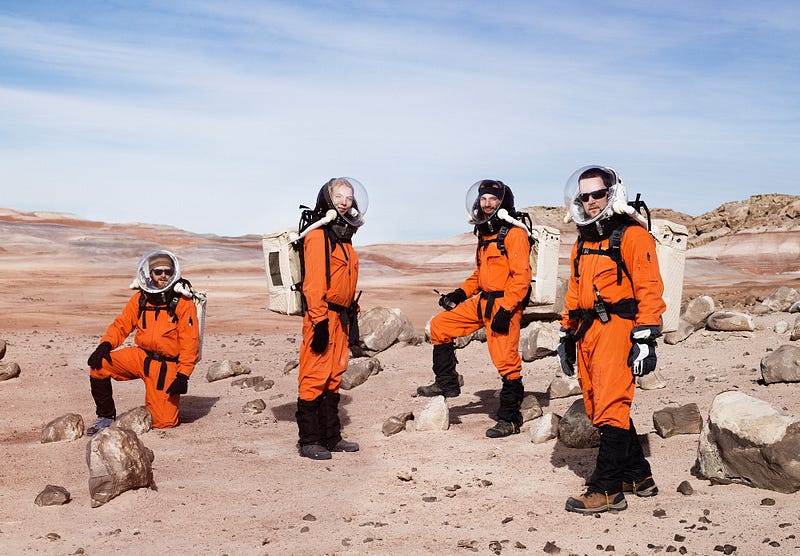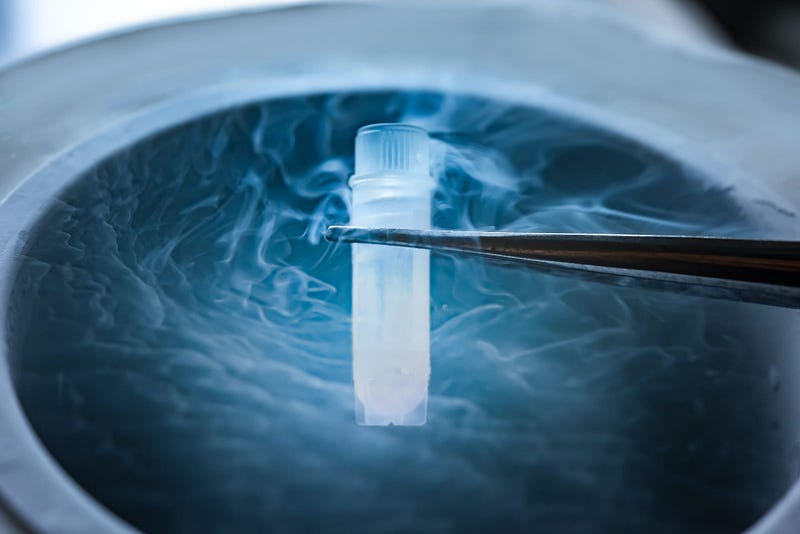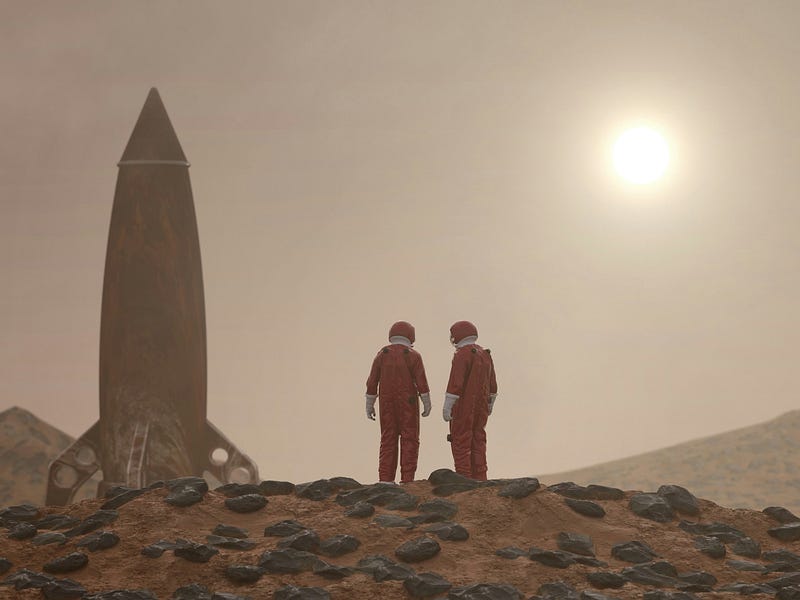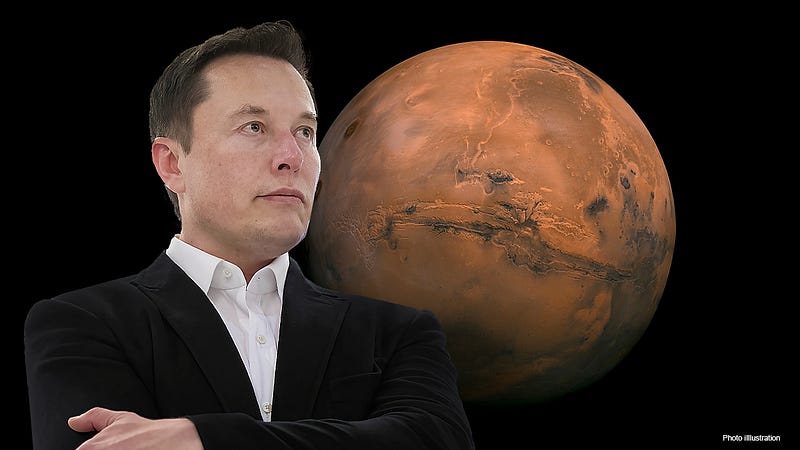Elon Musk's Ambitious Quest for Mars Colonization and Reproduction
Written on
Chapter 1: Musk's Vision for Mars
Elon Musk’s fascination with Mars is widely recognized. The billionaire and SpaceX CEO has long expressed his ambition to create a human settlement on the red planet. Recently, however, his vision has taken a more personal dimension. An anonymous report from The New York Times indicates that Musk has proposed to donate his sperm to facilitate the colonization of Mars. This unexpected news has ignited significant interest and discussions regarding the practicality and ethics of human reproduction in an extraterrestrial environment.
Musk envisions a Mars colony as a strategic necessity for humanity's future survival. He has frequently claimed that transforming humans into a multiplanetary species is essential to safeguard against potential global disasters on Earth, like asteroid collisions or nuclear conflicts. His dedication to this vision is evident through his substantial investments in SpaceX, a company focused on developing the technology required for interplanetary travel and habitation.

According to The New York Times, Musk has quietly instructed SpaceX employees to investigate the practicalities of establishing a settlement on Mars. Internal documents and interviews with over 20 employees reveal that various teams are tackling different aspects of this monumental endeavor. Their focus includes habitat construction, spacesuit design, and the particularly complex issue of reproduction in space. Two anonymous sources have indicated that Musk has even offered his sperm to aid in these reproductive efforts.
One of the primary challenges in creating a sustainable colony on Mars lies in understanding how the planet's environment affects human reproduction. Mars poses numerous adverse conditions, such as high levels of radiation and reduced gravity, both of which could significantly threaten human health and development.

Mars’ atmosphere is merely 1% as dense as Earth’s, providing limited protection from harmful solar and cosmic radiation. Prolonged exposure to such conditions could adversely impact human health, particularly for developing embryos and fetuses. To mitigate these risks, Musk has proposed the use of large glass domes or underground living spaces to shield inhabitants from radiation, although the efficacy of these strategies remains uncertain.
With only 38% of Earth’s gravity, the consequences of reduced gravitational forces on human pregnancy and fetal growth are largely unknown. On Earth, gravity is crucial to many biological processes, including circulation and skeletal development. The lack of typical gravitational forces on Mars may lead to significant complications during gestation and childbirth.

Recent scientific advancements have introduced the possibility of using assisted reproductive technologies, such as in vitro fertilization (IVF), to support reproduction in space. Adam Watkins, an associate professor of reproductive biology at the University of Nottingham, notes that freeze-dried sperm could be sent to Mars and rehydrated for IVF use. This method may enable reproduction without requiring men to be present on Mars initially.
Various organizations are investigating the potential for space reproduction. For instance, SpaceBorn United is examining IVF in space and plans to conduct experiments with mouse embryos before progressing to human trials. Collaborating with SpaceBorn United, David Cullen, a professor of space biotechnology at Cranfield University, aims to address the critical unknowns surrounding human reproduction in a space environment.

While the concept of reproduction on Mars is intriguing, it raises numerous ethical and practical concerns. The potential risks to mothers and infants in such a hostile environment must be carefully evaluated. Ethical guidelines and regulations will be crucial to ensure the safety and well-being of individuals involved in reproductive experiments in space.

Imagine a future where the first human child is born on Mars. If this milestone is successfully achieved, it could transform Mars into a bustling center of human activity, presenting vast new opportunities for exploration and expansion beyond Earth. Conversely, if the obstacles to space reproduction prove insurmountable, the inability to reproduce could jeopardize the sustainability of a Mars colony, necessitating continuous supplies and migration from Earth. This dependency would complicate the vision of a self-sufficient, interplanetary human existence.
Musk's preoccupation with Mars colonization is also related to his broader concerns regarding population trends on Earth. He has often voiced worries about underpopulation and the potential decline of the human race. By fathering multiple children and fostering reproduction on Mars, Musk seeks to counter these trends and encourage population growth.

Musk's personal involvement in the Mars colonization initiative is evident not only in his financial backing but also in his willingness to contribute his sperm for reproduction efforts. This action underscores his commitment to realizing his vision and highlights the lengths he is prepared to go to achieve it.
The news about Musk's offer has generated a wide spectrum of reactions from the public and scientific community. Some view it as a bold and innovative step toward a multiplanetary future, while others express concerns regarding the ethical implications and potential risks involved.
The first video titled "SpaceX founder Elon Musk plans to get humans to Mars by 2022" delves into Musk's ambitious plans and the technological advancements required for successful Mars missions.
The second video, "Elon Musk - Joe Rogan Experience #1470," features an in-depth discussion with Musk about his vision for Mars colonization and the future of humanity in space.
As SpaceX and other organizations continue to break new ground in space exploration, the dream of a Mars colony edges closer to reality. Achieving such an ambitious goal will hinge on overcoming numerous technical, biological, and ethical hurdles. Human reproduction in space is just one vital aspect of this endeavor, but it will play a crucial role in determining the long-term viability of a human presence on Mars.

GAME CHANGER MOMENT Elon Musk's vision for a Mars colony stands as one of the most daring projects in human history. His readiness to personally contribute to reproductive efforts on Mars illustrates his unwavering commitment to this ambition. While the challenges are daunting, the potential rewards of establishing a human settlement on Mars could be transformative for our species.
For those captivated by the possibilities of space colonization and the future of human reproduction on Mars, there is much to discover. Stay updated and engaged with the latest advancements in space science and technology. Follow the journey of SpaceX and other pioneering organizations as they strive to make the dream of a multiplanetary human presence a reality.